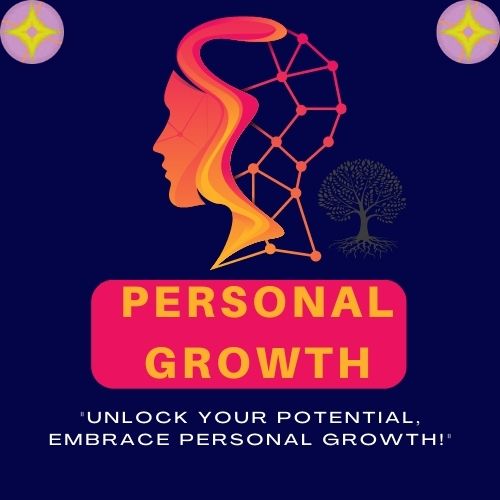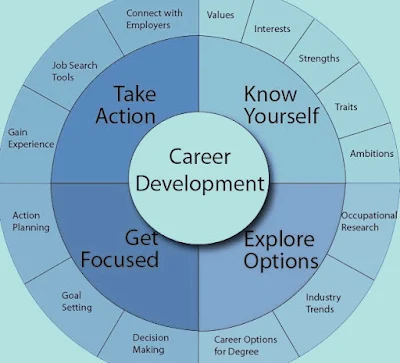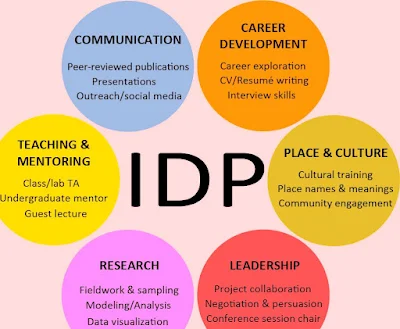Take Control of Your Career with an Individual Development Plan
An Individual Career Development Plan (ICDP) is a personalized, strategic document that outlines an individual's career goals, objectives, and the steps they need to take to achieve their desired professional growth and success. It is a proactive approach to managing one's career and ensuring that it aligns with their aspirations, skills, and ambitions.
In today's fast-paced and ever-evolving professional landscape, taking control of your career has never been more important. The traditional career trajectory of working for a single company for an entire lifetime is no longer the norm. Instead, individuals are expected to be agile, adaptable, and proactive in managing their own career paths. One powerful tool that can help you navigate this complex landscape is the Individual Development Plan (IDP). In this blog, we will explore the concept of IDPs, their importance, and how creating one can benefit your career.
What is an Individual Development Plan (IDP)?
An Individual Development Plan (IDP) is a structured and strategic approach to personal and professional growth. It is a dynamic document that outlines your career goals, strengths, weaknesses, and the steps needed to achieve your objectives. While IDPs are commonly associated with the workplace, they can also be a valuable tool in your personal life.
The Importance of Having an IDP
1. Clarity and Focus
An IDP provides clarity about your career goals and aspirations. By clearly defining what you want to achieve, you can stay focused on your objectives. This prevents you from drifting aimlessly in your career and allows you to make deliberate choices that align with your long-term vision.
2. Self-Assessment
IDPs encourage self-assessment. They prompt you to reflect on your skills, interests, values, and areas for improvement. This self-awareness is crucial for making informed career decisions. It allows you to play to your strengths and work on your weaknesses.
3. Goal Setting
Setting goals is an essential part of any IDP. These goals are typically categorized into short-term and long-term objectives. The act of goal setting itself is motivating and can boost your commitment to personal and professional development.
4. Skill Development
IDPs are a roadmap for skill development. If you want to move up the career ladder or change your career path, you need to acquire new skills. Your IDP should include strategies for gaining these skills, such as workshops, courses, or mentorship.
5. Career Advancement
Individual Development Plans are not just about personal growth; they are a tool for career advancement. When you actively work towards your goals and acquire new skills, you become a more valuable asset to your employer. This can lead to promotions, salary increases, and greater job security.
6. Adaptability
In today's ever-changing job market, adaptability is essential. An IDP encourages you to stay up-to-date with industry trends and technology. It also enables you to pivot your career path when necessary, ensuring that you remain relevant and competitive.
Creating an Effective IDP
1. Self-Assessment: Begin by understanding your strengths, weaknesses, interests, and values. This forms the foundation of your IDP.
2. Define Your Goals: Set specific, measurable, attainable, relevant, and time-bound (SMART) goals. Ensure your objectives align with your personal and professional aspirations.
3. Identify Resources: Determine what resources you need to achieve your goals. This may include courses, workshops, mentorship, or networking opportunities.
4. Create a Timeline: Develop a timeline for achieving your goals. This provides structure and accountability to your IDP.
5. Monitor and Adjust: Regularly review and update your IDP as your career evolves. Adapt to changing circumstances and goals.
Here are the key components of an ICDP:
Career Goals and Objectives: The ICDP starts with a clear definition of the individual's short-term and long-term career goals. These goals are specific and measurable, allowing the individual to track their progress.
Self-Assessment: To create an effective ICDP, individuals need to assess their strengths, weaknesses, skills, interests, and values. This self-awareness is vital in making informed career decisions.
Skills and Knowledge Enhancement: The plan outlines the skills and knowledge the individual needs to acquire or develop to achieve their career goals. This may include formal education, training programs, workshops, or self-directed learning.
Action Steps: An ICDP breaks down the career objectives into actionable steps. These steps are the practical measures individuals will take to reach their goals, such as networking, seeking mentorship, or pursuing specific job opportunities.
Timelines: Each action step is associated with a timeline or deadline. This helps individuals stay accountable and track their progress over time.
Resource Allocation: Individuals identify the resources required to achieve their career goals. This can include financial resources, time, access to mentors, or specific tools and technologies.
Networking and Relationships: Building a strong professional network is often a critical component of career development. The ICDP may include strategies for expanding and nurturing professional relationships.
Measuring Success: The ICDP defines how success will be measured, whether it's through achieving specific career milestones, increasing income, or gaining new qualifications.
Flexibility: An effective ICDP recognizes that circumstances and goals may change over time. It should be flexible and adaptable, allowing for adjustments as needed.
Regular Review: It's crucial to regularly review and update the ICDP. This ensures that it remains aligned with the individual's evolving career path and goals.
Conclusion:
Taking control of your career with an Individual Development Plan is an empowering and proactive approach to personal and professional growth. In a rapidly changing job market, the ability to adapt, acquire new skills, and set clear objectives is paramount. IDPs provide a structured framework for achieving these goals, ultimately leading to greater job satisfaction, career advancement, and long-term success. So, take the first step in shaping your future today by creating your own Individual Development Plan. Your career will thank you for it.


